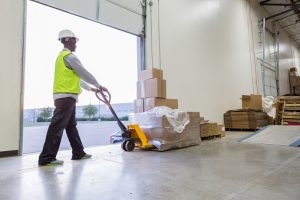 San Diego loading dock injuries are a common threat. Identifying all liable parties is often critical to obtaining appropriate compensation for injured workers and their families.
San Diego loading dock injuries are a common threat. Identifying all liable parties is often critical to obtaining appropriate compensation for injured workers and their families.
In fact, about 25 percent of all warehouse injuries occur on loading docks, according to Safety and Health Magazine.
Our workers' compensation attorneys in San Diego know common causes of dock injury include separation of a truck from the dock, fall accidents, forklift accidents and backover accidents. Too often, unattended docks are left open as a form of climate control in warehouses, that otherwise, lack in ventilation. Such unattended docks also increase the risk of accidents and injuries.
Loading Dock Safety Requirements
One common point of confusion is when a guardrail is required on a loading dock and when a visual barrier will suffice. Federal code, 26 CFR 1910.23(b), governs protection of open holes and wall openings. Fall protection barriers are required for openings with a drop of more than 4 feet. Unfortunately, this regulation does not always work to protect employees because most semi trailers and flatbeds closely align with that 48-inch height, which puts most docking platforms at a height range of 44 to 48 inches.
Confusion also exists because of a 1990 OSHA interpretation (55 FR 13407; April 10, 1990) that stated employees were not required to install guardrail systems on loading docks if they could demonstrate such safety devices would prevent work performance. However, it's important to note that interpretation involved an OSHA standard that was never implemented.
Still, because most docks are slightly lower than the 48-inch limit, a visual barrier is often all that is required. This typically involves a brightly painted chain or other device that warns those approaching of a fall risk but does little or nothing to prevent an actual fall or resulting injury.
Liability for Loading Dock Accidents
The loading and unloading of goods is what keeps America running. It's also a commonly overlooked cause of a significant number of work injuries each year. Consequently, OSHA also issues regulations specific to a wide variety of industries, including airlines, beverage delivery, grocery warehousing, logging, meatpacking, maritime and shipbuilding, ports and shipyards, the railroad industry, and oil and gas production and delivery.
From a liability standpoint, these cases can be complex. Injured workers and their families are best advised to contact a workers' compensation lawyer in San Diego who is also experienced in handling personal injury and third-party liability matters.
Workers' compensation benefits are often an injured employee's first line of defense. But such benefits may not cover all of a worker's losses, particularly in cases where substantial lost work is required for recovery or where an injury results in permanent, partial or total disability. Further complicating matters is the fact that many companies hire subcontractors to handle dock operations or classify workers as independent contractors, precisely to avoid exposure to liability in the event of a work accident.
Avenues of potential recovery may also include an employer, an employer's general liability insurer, a subcontractor or a subcontractor's insurer, or the auto insurance policy and owner or contractor of a truck involved in a docking accident.
Thus, a workers' compensation claim may represent just one part of a larger claim. One or more third-party defendants may also share blame for the incident. Proper recovery should involve identifying and making claims against all such liable parties. A workers' compensation attorney can further discuss your options in the event of an injury.
